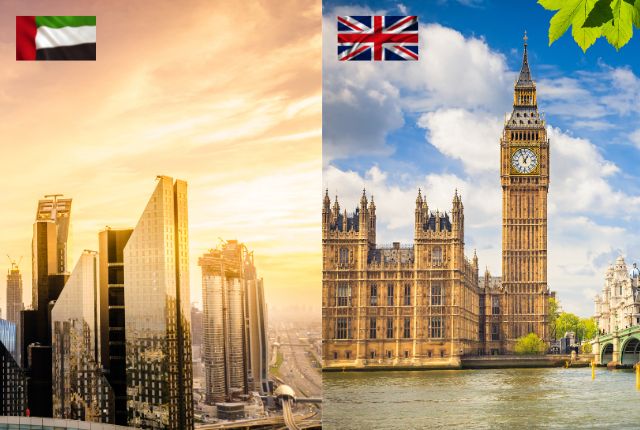When it comes to comparing two cities, it’s not just a matter of size; it’s about the heart, culture, and experiences that each city offers. In this article, we’ll explore the comparison between Dubai and London, delving into their respective land areas, populations, attractions, and the overall lifestyle they provide.
Are you ready to embark on this journey of exploration? Let’s begin!
Land Area: London Takes the Crown
London is substantially bigger than Dubai in terms of land area. This might come as a surprise to some, as Dubai’s towering skyscrapers and extravagant developments give the impression of vastness.
However, London’s metropolitan area covers about 1,572 square kilometers, while Dubai’s land area is around 4,114 square kilometers. In this respect, London stands as the larger city by a significant margin.
Population: A Bigger Single Population in London
Although London wins the land area battle, Dubai boasts a remarkable and diverse population. With its flourishing expatriate community, Dubai’s population has grown considerably in recent years.
However, London still holds the upper hand in terms of population. The UK’s capital is home to approximately 8.9 million residents, making it more populous than Dubai, which has around 3.4 million inhabitants.
Architectural Marvels: It’s a Bigger Building Site than London
Dubai is often referred to as the city of the future, and for a good reason. It’s renowned for its extraordinary architecture, including the iconic Burj Khalifa, the world’s tallest building.
Dubai’s construction fervor is unmatched, with ambitious projects constantly shaping its skyline. It’s a city in a perpetual state of development, which might lead one to say that it’s “a bigger building site than London.”
Eye on the Sky: London’s Iconic Ferris Wheel vs. Ain Dubai
London’s famous Ferris wheel, the London Eye, is an emblematic part of the city’s skyline. However, Dubai also boasts a giant observation wheel of its own, known as Ain Dubai.
This colossal wheel, situated on Bluewaters Island, stands at a staggering 250 meters in height. In comparison, the London Eye is 75 meters shorter. When it comes to towering over the skyline, Dubai has the upper hand.
Tourist Attractions: More to Do in London
For tourists looking to explore a myriad of cultural, historical, and entertainment attractions, London is often the preferred destination. Tourists will generally find more to do in London than Dubai, thanks to its rich history, world-class museums, theaters, and vibrant neighborhoods.
While Dubai offers its unique attractions, including the Burj Khalifa and Palm Jumeirah, it may not provide the same diverse range of experiences as London.
Cost of Living: London vs. Dubai
Another crucial aspect to consider is the cost of living. When comparing London and Dubai, it’s essential to take into account consumer prices. According to data, consumer prices in London are approximately 5.36% higher than in Dubai.
However, this gap can vary depending on individual lifestyles, preferences, and specific locations within each city.
Economic Prosperity: UAE vs. UK
When discussing the prosperity of a country or city, it’s essential to consider its economic strength. The UAE is one of the richest countries in the world, thanks to its abundant oil reserves and robust diversification efforts.
The UK, on the other hand, is also a prosperous nation, but the economic dynamics and structure differ significantly from the UAE.
Tourism Appeal: London vs. Dubai
If you’re wondering which city is more touristy, it’s important to note that London is traditionally seen as a more established tourist destination. With its wealth of historical sites, cultural institutions, and a variety of experiences, London is more touristy than Dubai.
However, Dubai has made substantial strides in the tourism industry, with a focus on luxury and entertainment, making it an increasingly popular destination for travelers.
Lifestyle and Migration: Why Do UK People Move to Dubai?
Many UK citizens choose to make the move to Dubai, and there are several compelling reasons behind this trend. Dubai offers a lifestyle that includes luxurious living, zero taxes on your salary, a rich blend of cultures, and year-round sunshine.
The allure of these advantages, along with a booming job market and a dynamic expatriate community, makes Dubai a desirable location for many UK citizens.
British Expats in Dubai: A Thriving Community
Approximately 250,000 British citizens have made Dubai their home. They have carved out a thriving expatriate community, contributing to the city’s diverse and cosmopolitan environment. Dubai has become a second home to many British expats, who embrace the city’s opportunities and lifestyle.
In conclusion, the question of whether Dubai is bigger than London encompasses various aspects, from land area to population, lifestyle, and economic dynamics. London takes the lead in terms of land area and population, while Dubai shines as a city of the future, with its monumental construction projects and iconic landmarks.
Both cities offer unique opportunities and lifestyles, catering to different preferences and interests.
Ultimately, the choice between London and Dubai depends on individual priorities and what one seeks in a city. Whether you prefer the historical richness and cultural diversity of London or the futuristic charm and luxury of Dubai, both cities have their own distinct allure. It’s not just a matter of size; it’s about the experiences, opportunities, and memories that these cities can provide.
So, is Dubai bigger than London? In terms of land area and population, the answer is no. But when it comes to possibilities, aspirations, and experiences, the answer is subjective and dependent on what you’re looking for in a city. In the end, both London and Dubai have their unique appeal, making them exceptional destinations in their own right.

